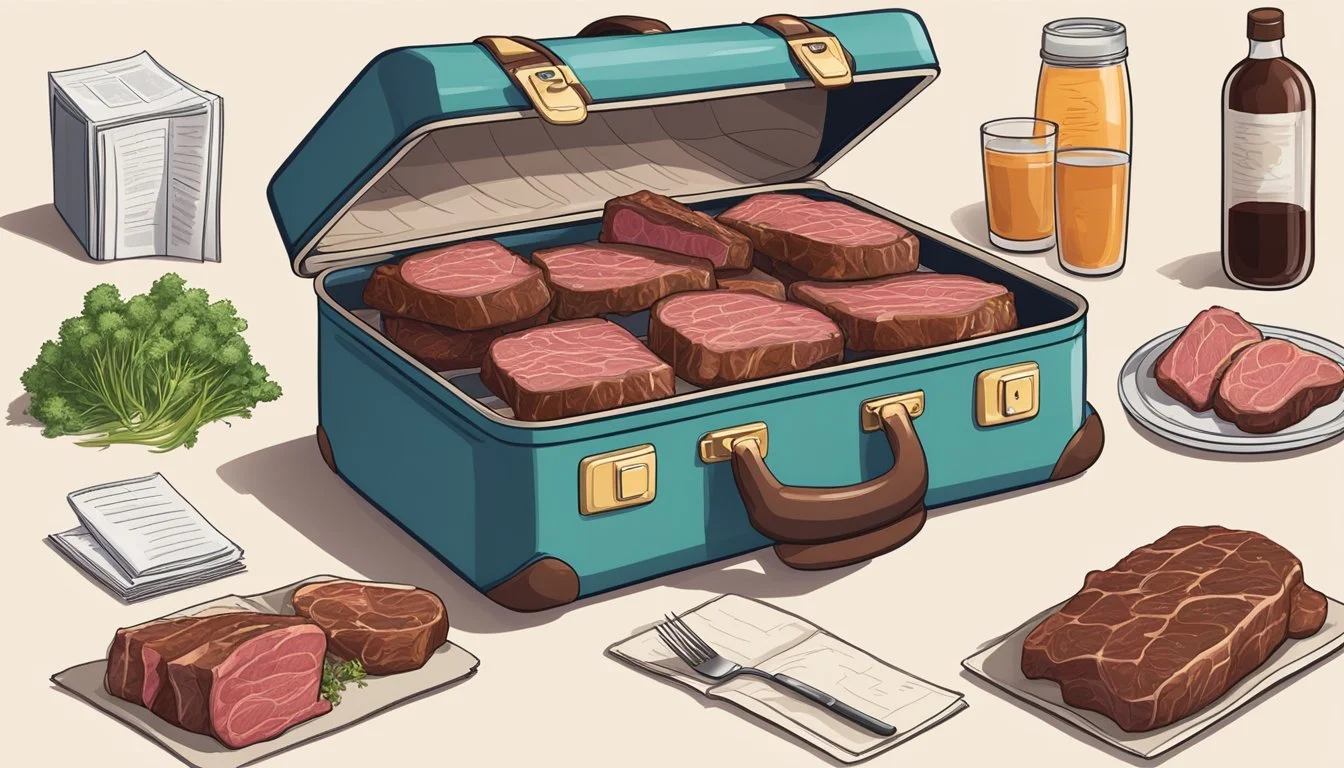5 Carnivore Diet Hacks for Traveling
Stay On Track Anywhere
Traveling while adhering to a carnivore diet can pose unique challenges, but it is entirely possible with the right strategies. This diet, which focuses on consuming animal products and excluding plant-based foods, requires careful planning to maintain dietary goals on the move. By mastering a few key hacks, travelers can ensure they stay committed to their carnivore lifestyle regardless of their destination.
Whether the journey is a short business trip or an extended vacation, having a set of practical tips can make all the difference. From selecting the best travel-friendly foods to finding places to shop for fresh meat, these hacks are designed to simplify the process. This article offers a comprehensive guide to staying on track with a carnivore diet while traveling.
1) Purchase Grass-Fed Beef Jerky
Grass-fed beef jerky is an ideal travel snack for those on a carnivore diet. It offers a convenient, nutrient-dense option that aligns perfectly with dietary goals. Grass-fed beef is preferred because it is often higher in omega-3 fatty acids, conjugated linoleic acid (CLA), and essential vitamins and minerals.
Selecting high-quality beef jerky ensures better nutritional benefits. Grass-fed beef generally contains more vitamin E and has a cleaner profile due to the natural diet of the cattle. This is important for maintaining the purity and health benefits associated with the carnivore diet.
Packaging portability makes beef jerky a highly practical choice for travel. It’s lightweight, has a long shelf life, and doesn’t require refrigeration. This makes it easy to pack and consume on the go, ensuring continuous adherence to the carnivore diet even during travel.
To maximize the benefits, it is recommended to check labels for added sugars or preservatives and opt for brands that commit to natural, straightforward ingredients. This safeguards that the jerky remains as close to a pure, carnivore-friendly snack as possible.
2) Bring Canned Sardines
Canned sardines are an excellent option for those on the carnivore diet who are traveling. They are portable, non-perishable, and packed with nutrients.
These small fish are rich in omega-3 fatty acids, which support heart health. Sardines are also a good source of protein and contain essential vitamins and minerals such as vitamin D and calcium.
Travelers should opt for sardines packed in water to avoid unwanted oils or sauces that may conflict with dietary goals. Additionally, wild-caught sardines are preferred over farm-raised ones to ensure a higher quality and better nutritional profile.
Canned sardines can be easily stored in luggage without refrigeration. Their convenience and nutritional benefits make them a reliable travel companion for those committed to maintaining their carnivore diet.
3) Carry Collapsible Travel Grill
A collapsible travel grill can be an invaluable tool for maintaining the carnivore diet on the go. These portable grills are designed to fold flat, making them easy to pack and carry in a suitcase or backpack.
Using a travel grill, travelers can cook fresh meats wherever they go, ensuring meal quality and dietary adherence.
Setting up a grill at a campsite, beach, or park can provide flexibility and control over meal preparation. This eliminates the need to rely on restaurants, which may not offer suitable options.
Collapsible grills are also typically quick to set up and easy to clean, making them a practical choice for regular travelers.
Many models offer features like adjustable heat levels and ample cooking space. This can accommodate a variety of meats, from steaks to chops, providing versatility for diverse meal plans.
Opting for a lightweight yet durable model will ensure it withstands frequent use and travel conditions.
4) Pack Pre-Cooked Bacon
Packing pre-cooked bacon is a straightforward and convenient strategy for staying on track with a carnivore diet while traveling. Pre-cooked bacon saves time, reduces mess, and ensures you always have a tasty protein source on hand, even when options are limited.
Pre-cooked bacon does not require refrigeration for short periods, making it ideal for road trips and flights. This feature is particularly useful when access to cooling facilities is restricted.
Individuals can prepare pre-cooked bacon at home by baking or frying it to their preferred level of crispiness. Once cooked, it can be stored in airtight containers, ensuring freshness and flavor preservation.
Many grocery stores also offer pre-cooked bacon, which might be a more convenient option for travelers looking to save preparation time. Look for brands without added sugars or unnecessary preservatives to keep the diet clean.
Consuming pre-cooked bacon can also help maintain energy levels during travel. Its high fat and protein content ensures sustained energy release, which can be beneficial during long journeys.
Whether used as a quick snack or integrated into meals, pre-cooked bacon is a versatile and reliable food choice for those adhering to a carnivore diet while traveling.
5) Stock Up on Pork Rinds
Traveling on the carnivore diet can be simplified by carrying a handy snack like pork rinds. These crunchy snacks are a great way to satisfy cravings without compromising dietary restrictions.
Pork rinds are made from fried pork skin, making them a low-carb, high-fat option. They do not require refrigeration and are easy to pack for any trip.
Available in various flavors and brands, it's essential to choose pork rinds without added sugars or non-carnivore-approved seasonings. Reading the ingredient list is crucial to ensure they align with the carnivore diet.
Utz Original Flavored Pork Rinds are often recommended due to their lack of additional flavorings. This makes them a safe and reliable option when on the go.
Pork rinds can also be homemade. Boil pork skins to soften them and remove excess fat, then dry and fry or bake them for a perfect travel snack.
Using pork rinds can prevent the temptation of non-carnivore-friendly snacks while traveling. They are versatile and can be enjoyed alone or paired with dips and other carnivore-approved foods.
Storing and Preserving Carnivore-Friendly Foods
Proper food storage and preservation are crucial for maintaining the quality and safety of carnivore-friendly foods while traveling. Focus on best practices for meat storage and explore various portable refrigeration options to keep foods fresh.
Best Practices for Meat Storage
When storing meat, begin by selecting high-quality cuts. Fresh meats should be stored in airtight containers to prevent contamination and extend shelf life.
For longer trips, consider freezing the meat before departure. Vacuum-sealed packaging helps retain freshness and flavor. Hard cheeses and dry-cured meats can be excellent alternatives due to their lower perishability.
Invest in a reliable cooler to store perishables. Use ice packs or dry ice to maintain a cold environment. Organize the cooler by placing frequently accessed items on top. Keeping the cooler out of direct sunlight can further enhance its efficiency.
Portable Refrigeration Options
Portable refrigeration ensures food safety during travel. High-quality coolers are a practical choice, offering durability and effective insulation. Brands like Yeti and Pelican are known for their superior performance.
Portable fridges provide more consistent cooling. They can be plugged into a car's power outlet or run on a battery. Thermoelectric coolers are another option, working on electrical power and suitable for extended road trips.
For air travel, insulated bags with gel packs can keep meat cool for shorter durations. Prioritize models with thick insulation and a secure seal. Choose a refrigeration method that matches the trip's length and food quantity to ensure freshness and safety throughout your journey.
Navigating Restaurants on a Carnivore Diet
Making strategic choices at restaurants can ensure a seamless carnivore dining experience. Key tactics include selecting appropriate dishes and clearly communicating dietary requirements to restaurant staff.
Choosing the Right Dishes
When eating out on a carnivore diet, it's essential to prioritize meat-focused dishes. Opt for steakhouses or BBQ joints, as they typically offer a variety of pure meat options. Order steaks, ribs, or burgers, ensuring they are cooked without any plant-based oils or sauces.
If visiting a place like Buffalo Wild Wings, their wings cooked in beef tallow can be an excellent choice. Five Guys also stands out for their 100% beef patties cooked in beef fat. Avoid sides containing grains, legumes, or vegetables. Instead, request eggs or bacon as suitable alternatives.
Communicating Special Dietary Needs
Clearly stating dietary needs is crucial. Inform the waiter about the strict requirement to avoid all plant-based products, including seasonings, oils, and sauces that may contain hidden sugars or other non-carnivore ingredients. Ask for your dishes to be cooked in butter or animal fats instead of vegetable oils.
When possible, call ahead to inquire about menu options and preparation methods. Specify that sauces be served on the side or omitted entirely. Polite yet firm communication can make a significant difference in ensuring the meal aligns with the carnivore diet requirements.
Essential Travel Gear for Carnivore Dieters
Having the right gear can make all the difference when maintaining a carnivore diet on the go. From compact cooking tools to travel-friendly food containers, proper planning and equipment ensure dietary consistency during travel.
Compact Cooking Tools
For carnivore dieters, portable cooking tools are indispensable. A small electric grill or a portable stove allows travelers to cook fresh meat easily. These devices are compact enough to fit in a suitcase and can be used in various settings, from hotel rooms to campsites.
Compact utensils, such as folding knives and lightweight spatulas, can make meal prep and consumption straightforward. An immersion heater can also be useful for quickly heating water or preparing hot beverages that complement the carnivore diet.
Travel-Friendly Food Containers
Insulated food containers and cooler bags help keep perishable foods fresh during travel. High-quality containers can store cooked meats, hard cheeses, or even prepped vegetables for those who mix in low-carb options. These items are essential for maintaining dietary consistency, especially during long trips.
For snacks, airtight containers are ideal for storing jerky, canned fish, or hard-boiled eggs. These containers prevent spoilage and make it easy to access nutritious food quickly. The ability to pack non-perishable and perishable items in advance minimizes the stress of finding suitable foods on the road.






